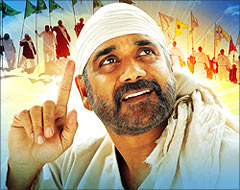Review: Shirdi Sai is Nagarjuna's show
September 06, 2012 14:12 IST
 Telugu film Shirdi Sai is not just a devotional to be seen by an older audience. Anyone can see it for the relevance of the simple teachings of the saint , writes Radhika Rajamani
Telugu film Shirdi Sai is not just a devotional to be seen by an older audience. Anyone can see it for the relevance of the simple teachings of the saint , writes Radhika Rajamani
K Raghavendra Rao carved a niche for himself in devotional films with Annamayya and Sriramadasu.
His latest release Shirdi Sai has his regular team of Akkineni Nagarjuna in the lead role as the guru from Shirdi, M M Keeravani as the music director and S Gopal Reddy as the cinematographer.
The film tells the familiar story of Sai Baba's life, the early years being shrouded in mystery, his appearance in Shirdi at a young age and his being considered as an avatar of Lord Dattatreya.
His disappearance from Shirdi and later reappearance, how he made Shirdi his home, and how the village folk were attracted to him and his miracles are all part of the Sai Baba narrative that the film plays out.
Most importantly the film captures the essential teachings propounded by Baba, like practising shraddha (faith) saburi (patience/compassion), and sab ka malik ek hai, emphasising that God is one and above caste, creed and religion.
The film details Sai Baba's encounters with people such as Mahalsapati (Sharad Babu), Gangubai (Rohini Hattangady), Nanavali (Sai Kumar), Das Ganam (Srikkanth), Baiza Bai (Vinaya Prasad), Lakshmi Bai (Rujutha Deshmukh), Tattya, Sundaribai (Kamalinee Mukherjee), and the British officer Wales (Srihari).
There's nothing new about the story, based as it is on the Sai Tattvam. There have been films and television serials on Shirdi Sai Baba earlier which have given us glimpses of his life and teachings.
However, the film is not just a monotonous biopic. There is an antagonist, Bhatia (Sayaji Shinde), who wants to see the end of Baba and therefore keeps plotting against him.
Some of these episodes bring in a comic element though they are too stretched out and get a tad repetitive and irritating, such as the dog chase.
There is a certain amount of dramatisation of the teachings in the Himalayan episode as cinematic liberties are taken here.
The song urges and screams for fundamental unity for all religions. Some episodes are too prolonged, like the one involving the British officer Wales and his Indian assistant played by Brahmanandam.
A film of this kind is bound to eulogise the central character, particularly since he is endowed with divine powers. The director Raghavendra Rao has tried to maintain a balance between entertaining viewing and capturing some of the spiritual essence as well.
Nagarjuna steals the show as Shirdi Sai. He exudes serenity and tranquillity necessary for portraying such a role. The calmness in his face and body language and the compassion in his eyes are remarkable. Shirdi Sai is yet another feather in Nagarjuna's cap after Annamayya and Sriramadasu.
The rest of the actors fit their roles well. It was a pleasant surprise watching Kamalinee Mukherhjee doing a cameo in the film.
M M Keeravani enhanced the film with his melodious and soul-stirring music.
Gopal Reddy's camera work was good. K Raghavendra Rao ensures moving and uplifting moments too. Shirdi Sai is not just a devotional to be seen by an older audience. Anyone can see it for the relevance of the simple teachings of the saint from Shirdi.
The film has a shot of the sanctum at Shirdi as a bonus for followers of the sage!
Rediff Rating: 

 Telugu film Shirdi Sai is not just a devotional to be seen by an older audience. Anyone can see it for the relevance of the simple teachings of the saint , writes Radhika Rajamani
Telugu film Shirdi Sai is not just a devotional to be seen by an older audience. Anyone can see it for the relevance of the simple teachings of the saint , writes Radhika Rajamani